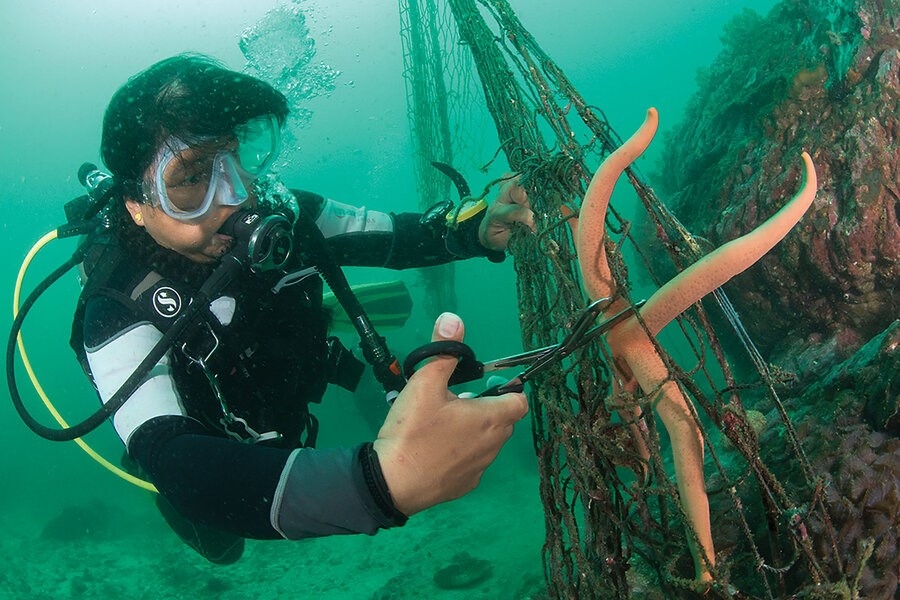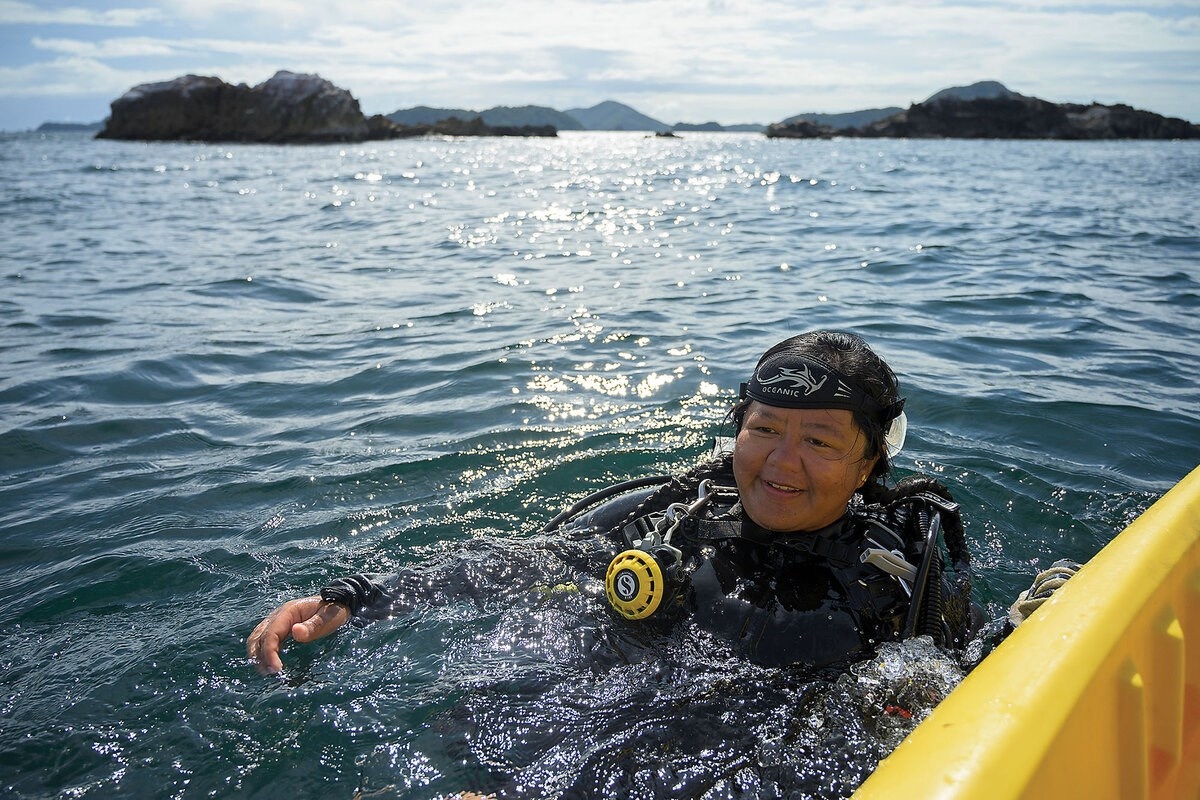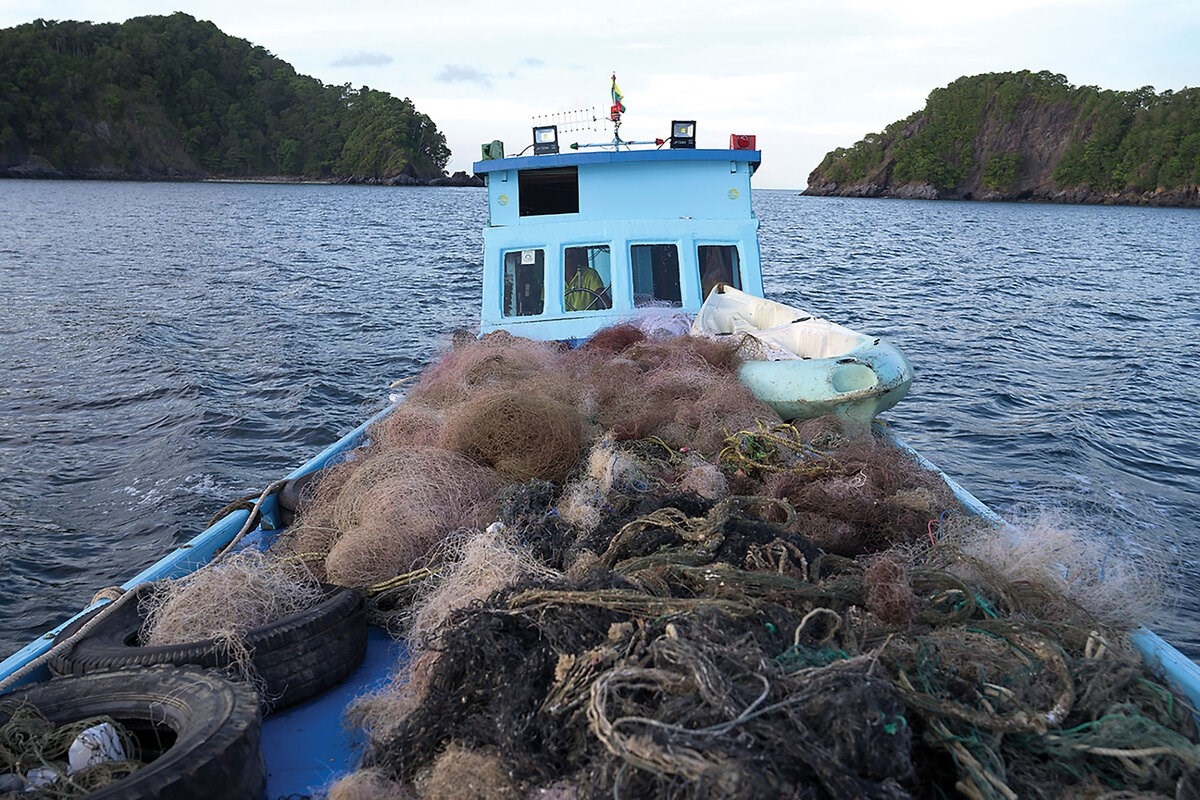REPRINTED WITH PERMISSION FROM THE CHRISTIAN SCIENCE MONITOR
Myanmar is in a time of political upheaval. Despite having few resources, one nonprofit is working to safeguard the country’s marine life.
 Thanda Ko Gyi frees a starfish from entanglement underwater. In 2018, she launched Myanmar Ocean Project, the country’s first registered marine conservation organization.Sirachi Arunrugstichai/Myanmar Ocean Project
Thanda Ko Gyi frees a starfish from entanglement underwater. In 2018, she launched Myanmar Ocean Project, the country’s first registered marine conservation organization.Sirachi Arunrugstichai/Myanmar Ocean Project
|Amsterdam
Thanda Ko Gyi came across a horrific sight in 2016 while diving in the waters off southern Myanmar. Many bamboo sharks and other marine animals lay dead or trapped alive in an abandoned fishing net. When she returned to the site 10 months later, the net hadn’t moved, as part of it was entwined in some coral on the ocean floor.
“It was hanging like a curtain, and it was still killing,” Ms. Thanda recounts in a phone call from Yangon, Myanmar’s largest city. At that moment, she vowed that she would do something about “ghost gear” – nets, traps, ropes, lines, and other fishing devices that are left behind by humans and indiscriminately kill marine life.
Ms. Thanda, whose undergraduate education was in architecture, had learned to dive as a university student in Australia. The abandoned gear that she discovered off southern Myanmar shocked her, but she says the suggestions she made to organizations and leaders in the country to combat the problem weren’t taken seriously because of her gender and her lack of formal training in marine conservation. So in 2018, Ms. Thanda launched her own nonprofit – Myanmar Ocean Project (MOP), the country’s first registered marine conservation organization.
For the next couple of years, Ms. Thanda led a team of international diving volunteers in removing nearly 2 tons of ghost gear from about 100 sites in the Myeik Archipelago in southern Myanmar.
“Prior to Thanda’s work, very few people had any idea of the extent of the ghost gear issue in Myanmar,” says Joel Baziuk, associate director of the Global Ghost Gear Initiative, which has helped MOP seek funding. “Thanda’s work has drawn attention to an area and an ecosystem that was thought to be more or less pristine, but under the surface lurks a huge amount of lost and abandoned fishing gear.”
 Sirachai Arunrugstichai/Myanmar Ocean ProjectMs. Thanda returns to the boat at the end of a dive.
Sirachai Arunrugstichai/Myanmar Ocean ProjectMs. Thanda returns to the boat at the end of a dive.
Based on the MOP team’s observations, Ms. Thanda wrote and published online in August 2020 what Mr. Baziuk says is the first status report on Myanmar’s ghost gear problem. But the COVID-19 pandemic raging at that time brought MOP’s ghost gear retrieval efforts to a halt. The 2021 military coup came not long after, shaking the nation and creating more challenges for MOP. “With the coup and COVID combined, things were really chaotic,” Ms. Thanda says. “I still remember the devastation I felt. I had planned so much.”
Undeterred, she pivoted to other projects. In the first half of 2021, she conducted research on the shark and ray trade in Rakhine, a western state racked by long-running violence. While interviewing fishers who were displaced and living in camps in Rakhine, she found that endangered sharks and rays were being processed for export to China. “You cannot go into these communities and ask people to stop,” Ms. Thanda says. “What are these people supposed to do when they haven’t been allowed to leave the camp for 10 years? ... I came into this thinking I’m saving species, but in reality, the context is so complicated.”
Ms. Thanda’s research helped her identify marine areas in Myanmar in urgent need of protection to conserve sharks and rays.
Domestic travel has been difficult since the coup, especially for men under age 30. Ms. Thanda’s male associates have had to avoid road travel to certain areas, and their phones and belongings have been searched by military personnel. “You have to build a level of tolerance if you want to keep working,” Ms. Thanda says.
Soon after the coup, she observed that local activists were creating comics, posters, leaflets, and other art to raise awareness about various social and political issues. Inspired by the positive reception to this art, she developed a comic series to discuss marine conservation topics with people in local communities, especially rural ones that lack educational resources.
“A comic book made it safe to engage with young people,” Ms. Thanda says. “Safe for the people engaging with it, safe for the funders, and safe for myself.”
Published online in 2022, the comic series “Our Ocean, Our Home” follows protagonist Thazin, a young girl who encounters various marine animals along Myanmar’s coast. MOP has since secured permits to print a small number of copies this year for distribution in some village schools.
 Sirachai Arunrugstichai/Myanmar Ocean ProjectNets that MOP removed from the water during dives in the Myeik Archipelago are left to dry on a boat before being packed away.
Sirachai Arunrugstichai/Myanmar Ocean ProjectNets that MOP removed from the water during dives in the Myeik Archipelago are left to dry on a boat before being packed away.
Six comic books in the series have been published, on topics ranging from turtles and whale sharks to ghost gear and Lampi Marine National Park, the country’s only protected marine area. Each issue is published in English and three other languages.
“When we started, the target audience for these comics were kids in coastal communities,” Ms. Thanda says. “But now, even kids who live inland, who have never seen the ocean, are enjoying the books.”
She is in discussion with potential partners to print more copies and to organize activities around the books to get more children engaged. In future issues, she hopes to cover topics such as overfishing and marine plastic pollution.
But in these difficult times in Myanmar, even releasing comic books turned out to be an emotionally fraught experience for Ms. Thanda and her team. “[Pro-democracy] activists were being hung on one of the days we were launching a comic online,” she recalls. “We didn’t want to release the comic that day, but I had to remind myself that a lot of kids need a healthy distraction.”
Ms. Thanda has also been working on creating a drop-off pontoon in Lampi Marine National Park where fishers can deposit any abandoned or lost nets they find. MOP recently built a sturdy pontoon that is meant to last at least a couple of years. At present, she is trying to find the best way to recycle the collected nets.
Because of sanctions against entities and individuals linked to the junta, many international funding bodies have been reluctant to finance projects in Myanmar. Ms. Thanda is now focused on raising money from within the country.
“Myanmar has very little marine conservation work being done,” says Tara Sayuri Whitty, a California-based socioecological researcher who has worked in Myanmar for several years. “Any good work helps fill this large gap.”
Mr. Baziuk says that doing such work “in remote areas of Myanmar, often with very little in the way of resources, and in the face of political upheaval, is quite something.”
Much of the success of Ms. Thanda’s efforts depends on the security situation. “I’ve been pushing so hard,” she says.
“Sometimes I need to remember that I’m living through war,” she adds.
Page created on 11/18/2024 5:10:51 PM
Last edited 11/18/2024 5:22:54 PM
